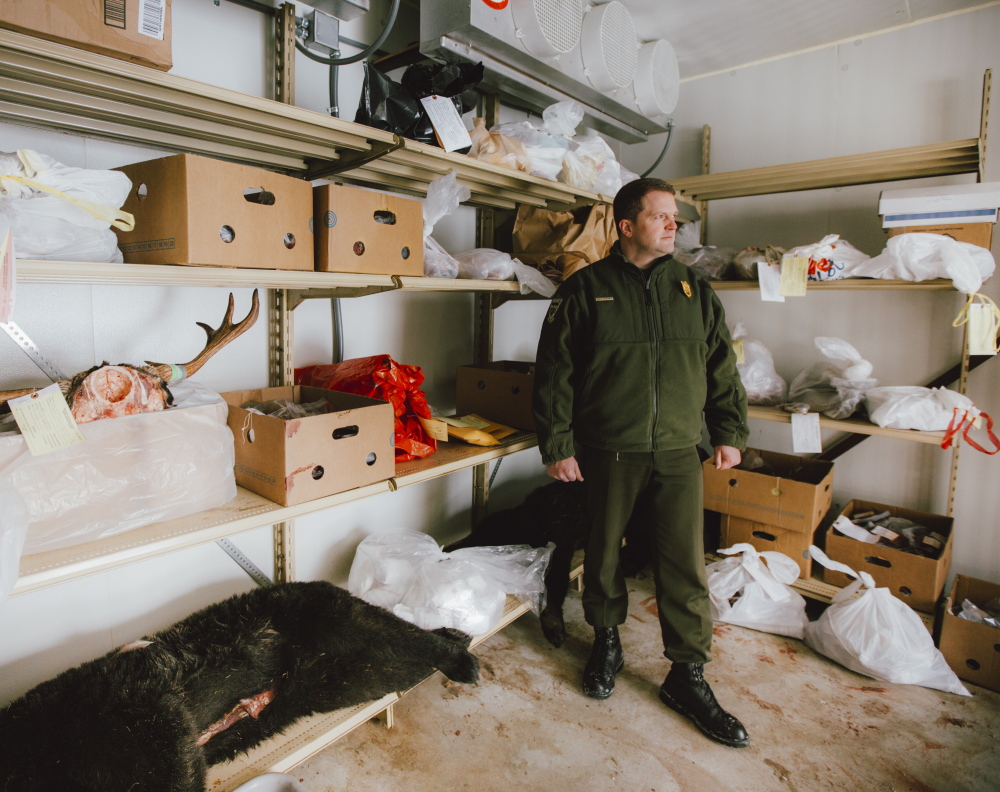Last week it was six deer from Kennebec County. Next week it could be a moose or bear from the far reaches of Aroostook County.
Whatever it is, Jason Hall will take it.
January is a busy month for Hall – head of the state’s Hunters for the Hungry program – because of the hundreds of pounds of meat from poached wildlife finally making its way to a program designed to get game meat to some of Maine’s most vulnerable residents.
“It’s like a late Christmas for us,” he said.
That meat – from deer, moose and bears taken illegally – is stored by game wardens until criminal poaching cases are adjudicated, then distributed to nearly 300 food programs statewide. The poached meat provides a welcome boost to the program during a time of year when Mainers aren’t out hunting.
“We take in hundreds, if not thousands, of pounds of meat annually from seized animals, the majority of them taken illegally,” said Cpl. John MacDonald of the Maine Warden Service. “If we can help feed people who need food, there’s no better way to do that. We can bring a good ending to what started out as a criminal case involving poaching. It’s a way to provide back to the community that these poachers are stealing from.”
NOT A WELL-KNOWN PROGRAM
The majority of the meat donated to Hunters for the Hungry comes from law-abiding and generous hunters, from animals killed in road collisions and from poaching cases. Last year, nearly 5,000 pounds of meat was distributed to 246 food pantries, soup kitchens and shelters across the state. The program started in 1996 after the Legislature approved a bill allowing people to donate wild game to those in need.
Hall, director of the Department of Agriculture, Conservation and Forestry’s Emergency Food Assistance Program, has called Hunters for the Hungry one of the state’s best-kept secrets, although donations have increased in the past few years as officials spread the word. In the late 1990s, the program distributed less than 3,000 pounds of meat each year, but that’s now jumped to an average of around 5,000 pounds.
“We’re a hunter’s paradise. We have a lot of generous people,” Hall said. “The wild game is a high-protein, low-fat source of food. It does make a big difference in Maine.”
HELP FROM BUTCHERS, CASH DONORS
The rising popularity of the program also has resulted in more financial donations used to pay to process meat and distribute it to food pantries. This year, the state will spend around $4,000 to process meat, though many butchers also donate their time. That money would have come from the state budget if not for donations from the Walmart Distribution Center Volunteer Assistance Program in Lewiston, Hall said.
When the distribution center employees volunteer – in this case, when they go hunting and donate game meat – Walmart will donate $250 for every 25 hours spent giving back to the community. Those donations amounted to more than $11,000 in 2014, with checks still rolling in, Hall said.
“We’ve been very fortunate that it hasn’t cost the state anything for three years,” Hall said.
MacDonald said most of the game meat given by game wardens to Hunters for the Hungry comes from poaching cases, though they also provide meat from road kill and controlled hunts. Some poached animals may still be intact when seized by game wardens, but much of it comes right out of poachers’ freezers, he said. All of it is stored in climate-controlled evidence rooms until court cases are over, often in January.
A LOT OF MOUTHS TO FEED
The meat is welcomed by the food programs that sometimes struggle to feed hungry Mainers, Hall said. A recent study by Good Shepherd Food Bank and Feeding America showed one in seven Mainers – an estimated 178,000 people – go to food pantries and meal programs for food. That includes more than 50,000 children and 45,500 seniors.
Mary Zwolinski, executive director of Wayside Food Programs in Portland, said Hunters for the Hungry “just makes sense” in a state like Maine. Wayside last year distributed 75 pounds of fish donated from a fishing derby, and periodically gets meat from undamaged road kill picked up in Cumberland County.
“It does seem that Mainers really appreciate it. For people who rely on pantries or community meals, it’s a great source of protein,” she said. “I think (Hunters for the Hungry) is a great program and I wish there was more of it because it’s so well received.”
Send questions/comments to the editors.




Success. Please wait for the page to reload. If the page does not reload within 5 seconds, please refresh the page.
Enter your email and password to access comments.
Hi, to comment on stories you must . This profile is in addition to your subscription and website login.
Already have a commenting profile? .
Invalid username/password.
Please check your email to confirm and complete your registration.
Only subscribers are eligible to post comments. Please subscribe or login first for digital access. Here’s why.
Use the form below to reset your password. When you've submitted your account email, we will send an email with a reset code.